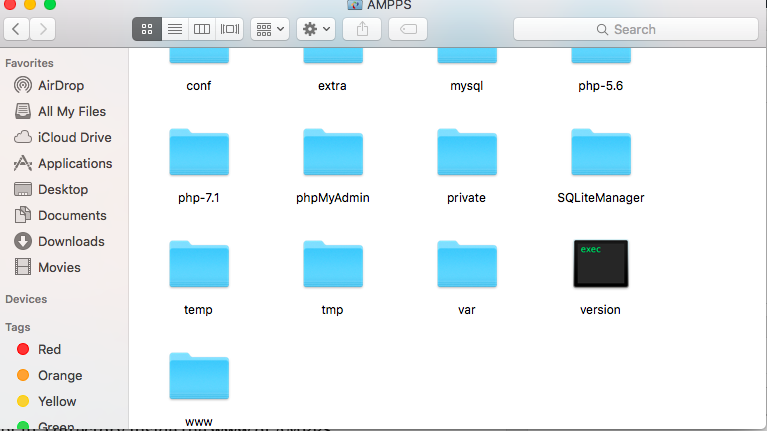The Host is a remote module installed on a target (i.e. remote) PC. This module works for both unattended and attended access.
Get the Toolbox App to download and its future updates with ease. Is also available as a snap package. If you’re on Ubuntu 16.04 or later, you can install from the command line. Sudo snap install phpstorm -classic. The Eclipse Foundation - home to a global community, the Eclipse IDE, Jakarta EE and over 375 open source projects, including runtimes, tools and frameworks.
Related links: About Remote Utilities
Agent is a remote module for spontaneous-only support. The Agent displays its own window that can be branded with your custom logo and text. Agent doesn't require installation and administrative privileges to run.
Related links: About Remote Utilities
By downloading, installing or using Remote Utilities Viewer for Mac, you agree to the terms of our End User License Agreement.
How to Install phpMyAdmin on MacOS Introduction. PhpMyAdmin is a free and open source tool for the administration of MySQL and MariaDB.As a portable web application written in PHP, it has become one of the most popular administration tool for MySQL. In this tutorial, we will learn the steps involved in the installation of phpMyAdmin on MacOS.
Get the Toolbox App to download and its future updates with ease. Is also available as a snap package. If you’re on Ubuntu 16.04 or later, you can install from the command line. Sudo snap install phpstorm -classic. In this article. The following instructions assume a clean environment and show how to install PHP 8.0, the Microsoft ODBC driver, the Apache web server, and the Microsoft Drivers for PHP for SQL Server on Ubuntu, Red Hat, Debian, Suse, Alpine, and macOS.
Remote Utilities Viewer is available for Mac. With Viewer for Mac you can remotely connect from your Mac computer to Windows computers with Host or Agent running*.
Version 1.0.10.q Beta 10, July 30, 2021.
30-day trial. License required after trial expires.
System requirements | SHA-256

* Host and Agent for Mac are coming soon
You can post your beta testing feedback and bug reports in this forum thread.
Mac OSX 10.14 (Mojave) or later
viewer1.0.10.b10.dmg
5fa2c08e5c2f42277d01c86a50dfd6dbd762193ac0a940d5b893a41a037d7649
Linux Binary Release • Mac OS X Binary Release • iOS Binary Release • Windows Binary Release

You can install ImageMagick from source. However, if you don't have a proper development environment or if you're anxious to get started, download a ready-to-run Linux or Windows executable. Before you download, you may want to review recent changes to the ImageMagick distribution.
ImageMagick source and binary distributions are available from a variety of FTP and Web mirrors around the world.
Linux Binary Release
These are the Linux variations that we support. If your system is not on the list, try installing from source. Although ImageMagick runs fine on a single core computer, it automagically runs in parallel on multi-core systems reducing run times considerably.
| Version | Description |
|---|---|
| magick | Complete portable application on Linux, no installation required. Just download and run. AppImages require FUSE and libc to run. Many distributions have a working FUSE setup out-of-the-box. However if it is not working for you, you must install and configure FUSE manually. |
| ImageMagick-7.1.0-8.x86_64.rpm | Redhat / CentOS 8.3 x86_64 RPM |
| ImageMagick-libs-7.1.0-8.x86_64.rpm | Redhat / CentOS 8.3 x86_64 RPM |
| ImageMagick RPM's | Development, Perl, C++, and documentation RPM's. |
| ImageMagick-i386-pc-solaris2.11.tar.gz | Solaris Sparc 2.11 |
| ImageMagick-i686-pc-cygwin.tar.gz | Cygwin |
| ImageMagick-i686-pc-mingw32.tar.gz | MinGW |
Verify its message digest.
ImageMagick RPM's are self-installing. Simply type the following command and you're ready to start using ImageMagick:
You'll need the libraries as well:
Note, if there are missing dependencies, install them from the EPEL repo.
For other systems, create (or choose) a directory to install the package into and change to that directory, for example:
Next, extract the contents of the package. For example:
Set the MAGICK_HOME environment variable to the path where you extracted the ImageMagick files. For example:
If the bin subdirectory of the extracted package is not already in your executable search path, add it to your PATH environment variable. For example:
On Linux and Solaris machines add $MAGICK_HOME/lib to the LD_LIBRARY_PATH environment variable:
Finally, to verify ImageMagick is working properly, type the following on the command line:
Congratulations, you have a working ImageMagick distribution under Linux or Linux and you are ready to use ImageMagick to convert, compose, or edit your images or perhaps you'll want to use one of the Application Program Interfaces for C, C++, Perl, and others.
Mac OS X Binary Release
We recommend Homebrew which provides pre-built binaries for Mac (some users prefer MacPorts). Download HomeBrew and type:
ImageMagick depends on Ghostscript fonts. To install them, type:
The brew command downloads and installs ImageMagick with many of its delegate libraries (e.g. JPEG, PNG, Freetype, etc). Homebrew no longer allows configurable builds; if you need different compile options (e.g. librsvg support), you can download the ImageMagick Mac OS X distribution we provide:
| Version | Description |
|---|---|
| ImageMagick-x86_64-apple-darwin20.1.0.tar.gz | macOS High Sierra |
Verify its message digest.
Create (or choose) a directory to install the package into and change to that directory, for example:
Next, extract the contents of the package. For example:
Set the MAGICK_HOME environment variable to the path where you extracted the ImageMagick files. For example:
If the bin subdirectory of the extracted package is not already in your executable search path, add it to your PATH environment variable. For example:
Set the DYLD_LIBRARY_PATH environment variable:
Finally, to verify ImageMagick is working properly, type the following on the command line:
Note, the display program requires the X11 server available on your Mac OS X installation DVD. Once that is installed, you will also need to set export DISPLAY=:0.
The best way to deal with all the exports is to put them at the end of your .profile file
Congratulations, you have a working ImageMagick distribution under Mac OS X and you are ready to use ImageMagick to convert, compose, or edit your images or perhaps you'll want to use one of the Application Program Interfaces for C, C++, Perl, and others.
iOS Binary Release
~Claudio provides iOS builds of ImageMagick.
Download iOS Distribution
You can download the iOS distribution directly from ImageMagick's repository.
There are always 2 packages for the compiled ImageMagick:
- iOSMagick-VERSION-libs.zip
- iOSMagick-VERSION.zip
The first one includes headers and compiled libraries that have been used to compile ImageMagick. Most users would need this one.
ImageMagick compiling script for iOS OS and iOS Simulator
To run the script:
where VERSION is the version of ImageMagick you want to compile (i.e.: 7.1.0-8, svn, ...)
This script compiles ImageMagick as a static library to be included in iOS projects and adds support for
- png
- jpeg
- tiff
Upon successful compilation a folder called IMPORT_ME is created on your ~/Desktop. You can import it into your Xcode project.
Xcode project settings
After including everything into Xcode please also make sure to have these settings (Build tab of the project information):
- Other Linker Flags: -lMagickCore-Q16 -lMagickWand-Q16 -ljpeg -lpng -lbz2 -lz
- Header Search Paths: $(SRCROOT) - make it Recursive
- Library Search Paths: $(SRCROOT) - make it Recursive
On the lower left click on the small-wheel and select: Add User-Defined Setting
- Key: OTHER_CFLAGS
- Value: -Dmacintosh=1
Sample project
A sample project is available for download. It is not updated too often, but it does give an idea of all the settings and some ways to play around with ImageMagick in an iOS application.
Windows Binary Release
ImageMagick runs on Windows 10 (x86 & x64), Windows 8 (x86 & x64), Windows 7 (x86 & x64), Windows Server 2012, Windows Vista (x86 & x64) with Service Pack 2, Windows Server 2008 (x86 & x64) with Service Pack 2, and Windows Server 2008 R2 (x64).
The amount of memory can be an important factor, especially if you intend to work on large images. A minimum of 512 MB of RAM is recommended, but the more RAM the better. Although ImageMagick runs well on a single core computer, it automagically runs in parallel on multi-core systems reducing run times considerably.
Easy Php Download Mac
The Windows version of ImageMagick is self-installing. Simply click on the appropriate version below and it will launch itself and ask you a few installation questions. Versions with Q8 in the name are 8 bits-per-pixel component (e.g. 8-bit red, 8-bit green, etc.), whereas, Q16 in the filename are 16 bits-per-pixel component. A Q16 version permits you to read or write 16-bit images without losing precision but requires twice as much resources as the Q8 version. Versions with dll in the filename include ImageMagick libraries as dynamic link libraries. Unless you have a Windows 32-bit OS, we recommend this version of ImageMagick for 64-bit Windows:
| Version | Description |
|---|---|
| ImageMagick-7.1.0-8-Q16-HDRI-x64-dll.exe | Win64 dynamic at 16 bits-per-pixel component with High-dynamic-range imaging enabled |
Or choose from these alternate Windows binary distributions:
| Version | Description |
|---|---|
| ImageMagick-7.1.0-8-Q16-x64-static.exe | Win64 static at 16 bits-per-pixel component |
| ImageMagick-7.1.0-8-Q8-x64-dll.exe | Win64 dynamic at 8 bits-per-pixel component |
| ImageMagick-7.1.0-8-Q8-x64-static.exe | Win64 static at 8 bits-per-pixel component |
| ImageMagick-7.1.0-8-Q16-x64-dll.exe | Win64 dynamic at 16 bits-per-pixel component |
| ImageMagick-7.1.0-8-Q16-HDRI-x64-dll.exe | Win64 dynamic at 16 bits-per-pixel component with high dynamic-range imaging enabled |
| ImageMagick-7.1.0-8-Q16-HDRI-x64-static.exe | Win64 static at 16 bits-per-pixel component with high dynamic-range imaging enabled |
| ImageMagick-7.1.0-8-Q16-x86-dll.exe | Win32 dynamic at 16 bits-per-pixel component |
| ImageMagick-7.1.0-8-Q16-x86-static.exe | Win32 static at 16 bits-per-pixel component |
| ImageMagick-7.1.0-8-Q8-x86-dll.exe | Win32 dynamic at 8 bits-per-pixel component |
| ImageMagick-7.1.0-8-Q8-x86-static.exe | Win32 static at 8 bits-per-pixel component |
| ImageMagick-7.1.0-8-Q16-HDRI-x86-dll.exe | Win32 dynamic at 16 bits-per-pixel component with high dynamic-range imaging enabled |
| ImageMagick-7.1.0-8-Q16-HDRI-x86-static.exe | Win32 static at 16 bits-per-pixel component with high dynamic-range imaging enabled |
| ImageMagick-7.1.0-portable-Q16-x64.zip | Portable Win64 static at 16 bits-per-pixel component. Just copy to your host and run (no installer, no Windows registry entries). |
| ImageMagick-7.1.0-portable-Q16-x86.zip | Portable Win32 static at 16 bits-per-pixel component. Just copy to your host and run (no installer, no Windows registry entries). |
| ImageMagick-7.1.0-portable-Q8-x64.zip | Portable Win64 static at 8 bits-per-pixel component. Just copy to your host and run (no installer, no Windows registry entries). |
| ImageMagick-7.1.0-portable-Q8-x86.zip | Portable Win32 static at 8 bits-per-pixel component. Just copy to your host and run (no installer, no Windows registry entries). |
| ImageMagick-7.1.0-portable-Q16-HDRI-x64.zip | Portable Win64 static at 16 bits-per-pixel component with high dynamic-range imaging enabled. Just copy to your host and run (no installer, no Windows registry entries). |
| ImageMagick-7.1.0-portable-Q16-HDRI-x86.zip | Portable Win32 static at 16 bits-per-pixel component with high dynamic-range imaging enabled. Just copy to your host and run (no installer, no Windows registry entries). |
Verify its message digest.
To verify ImageMagick is working properly, type the following in an Command Prompt window:
If you have any problems, you likely need vcomp120.dll. To install it, download Visual C++ Redistributable Package.
Note, use a double quote (') rather than a single quote (') for the ImageMagick command line under Windows:
Mysql Download Mac Os X

Use two double quotes for VBScript scripts:
Php Download Mac
Congratulations, you have a working ImageMagick distribution under Windows and you are ready to use ImageMagick to convert, compose, or edit your images or perhaps you'll want to use one of the Application Program Interfaces for C, C++, Perl, and others.